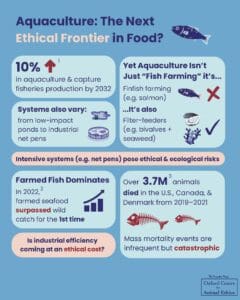Why farmed seafood deserves an ethical debate
This is an opinion piece which was written as a direct outgrowth of the Oxford Centre for Animal Ethics’ Annual Summer School, held in August of 2025.
Some of us may be familiar with the ethical concerns around eating meat produced on land, like beef, poultry, and pork. At large-scale industrial livestock operations, animals are confined and raised in concentration, which can harm them, as well as the workers, neighbors, and surrounding environment. In poultry operations, for example, birds are often cramped into less than a square foot of space, leading to aggression, waste buildup, and disease. But have you ever thought about ethical concerns when eating farmed salmon? What about farmed shrimp? Instead of barns, some aquatic species are concentrated in large net pens, where they too can become agitated and potentially generate pollution or encounter problems with disease.
The practice of aquaculture, which has existed since 4,000 BCE, has long been a way to farm aquatic animals and plants. However, in recent decades, large-scale industrial forms of aquaculture have rapidly grown into a booming global industry that some have hailed as the future of protein production. On the surface, it could be perceived as a sustainable and scalable solution to help address food insecurity and environmental degradation. For others, it is a long-awaited answer to numerous problems associated with our current food system — which is vulnerable, inequitable, and unsustainable. However, regardless of what role aquaculture can play in food systems, it is not off the hook in terms of ethical concerns.
The ethical debate surrounding aquaculture is not straightforward. Some proponents argue that aquatic animals require less food than land animals, making them more efficient and less resource-intensive. Second, many believe them to be less sentient than, say, a pig or a cow. And third, they provide nutrient-dense foods around the world, especially in the Global South, at what is perceived to be less environmental cost than land animals.
But critics are concerned that industrial-scale aquaculture operations are creating a similar set of harms as industrial livestock production on land, such as damaging the health of inland waters and oceans, potentially causing animals to suffer, and contributing to antibiotic resistance through misuse of these critically important drugs. Such concerns may be warranted. If industrial livestock production has taught us anything, it’s that efficiency often comes at the cost of public health, ethics, and ecology. Is aquaculture just the next frontier that the industrial food system is angling to cash in on, despite risks to humans, animals, and the environment?

There is no simple answer to that question. While there is reason for concern, some of the backlash against aquaculture is misplaced. Aquaculture is an extremely diverse activity and can occur on a spectrum from small to large-scale. Nearly 600 species are farmed, including seaweeds, mollusks, shrimps, herbivorous fish, and carnivorous fish. Production methods range from extensive systems requiring little or no external inputs like backyard ponds, to highly intensive industrial farms involving confinement of fish in net pens, commercial feed inputs, and veterinary drugs. Some of these practices may give rise to concerns, while others raise very few ethical red flags.
For instance, small-scale aquaculture occurring in backyard ponds contributes to the fight against malnutrition, as does other forms of inland aquaculture, particularly throughout low- and middle-income countries. These forms of aquaculture also pose fewer ecological, animal, and human harms. On the other hand, large-scale industrial aquaculture may cater more to the demands of Western consumers and carries higher potential ecological and animal risks. As such, there is no one-size-fits-all ethical truth about aquaculture.
Whether experts deem all forms of aquaculture ethical or not, it is happening — and fast. Global aquaculture has grown at an average annual rate of 7 percent over the last three decades, and animal aquaculture production surpassed wild fisheries for the first time in 2022. It is important to seize the opportunity to shape the industry, especially large-scale industrial aquaculture, as it evolves and matures to avoid the harmful trajectory that industrial agriculture on land has followed.
This is why the Oxford Centre for Animal Ethics’ Annual Summer School, and its special attention to aquaculture, was so timely. The event brought together an interdisciplinary group of scholars to discuss the ethical considerations of activities that hold animals captive and how to influence responsible policies moving forward.
Through open dialogue, and by resisting the urge to make binary moral declarations, we can wade the ethically murky waters with one certainty in mind: we should not allow industrial aquaculture to follow the same trajectory as its counterparts on land.
Get the latest food news from FoodPrint.
By subscribing to communications from FoodPrint, you are agreeing to receive emails from us. We promise not to email you too often or sell your information.
Top photo by GarkushaArt/Adobe Stock.
More Reading
Reimagining wild fisheries with the whole ecosystem in mind
February 13, 2026
More than food: Making seafood more sustainable by using 100% of the fish
February 6, 2026
Salmon hatcheries: Unsuccessful conservation, insufficient regulation, and poor animal welfare
September 16, 2025
Think you’re eating local seafood? Beware of 'local-washing'
May 21, 2025
When bycatch is on the menu
December 12, 2024
The quest for more sustainable caviar
July 3, 2024
Celebrating the Black history of oysters with chef Jasmine Norton
June 21, 2024
Oyster farming is the good kind aquaculture
April 2, 2024
A new report sheds light on the problems behind our imported shrimp
March 27, 2024
